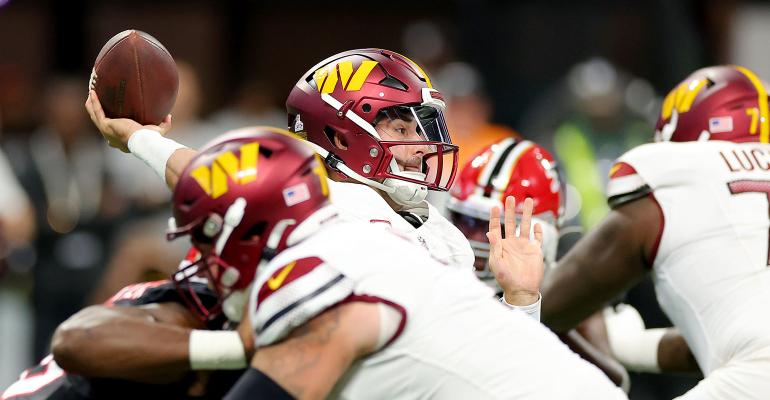(Bloomberg Opinion) -- High interest rates, geopolitical risks and skittish investors have created the worst year for mergers and acquisitions in a decade. But sports is one corner of the global investment market where deals just won't stop. From the proposed merger of the PGA and LIV golf tours to the $6 billion acquisition of the Washington Commanders, billions in investment capital is finding its way onto the field of play.
Goldman Sachs Group Inc. is among those ready to get in on the game. Last month, the bank announced a new “sports franchise” unit within its investment banking division. It shouldn’t have any problems finding business. In uncertain economic times, sports are turning out to be the resilient asset class that (very big) investors simply can’t pass up.
The deals are coming fast. In the last 10 months, they were highlighted by, among other transactions, the world’s largest pro wrestling and mixed-martial arts promoters merging to create a $21 billion goliath and Michael Jordan selling the Charlotte Hornets for $3 billion. But it’s not just teams and leagues dealing. In the second quarter, the sports technology sector, which ranges over everything from gambling tech to wearables, saw more than 100 M&A deals, exceeding the volume and dollar amounts from the previous four quarters.
Investors should be interested: Few asset classes have appreciated as dramatically as sports franchises in recent years. Between 2018 and 2023, the combined value of Forbes’ analysis of the 50 most valuable sports franchises increased by 90% to $256 billion.
Three factors drive that growth. First, the rights to broadcast and stream live sports continue to grow in value. In 2023, the global value of the industry’s media rights reached $55 billion, and one analyst expects it to hit $65 billion in 2025. Second, sports viewership has remained incredibly resilient, even after the Covid pandemic forced the shutdown of live events. As just one example, early in the 2023 season, the NFL is seeing some of its best television ratings in years (partly thanks to Taylor Swift). Likewise, the 2022-23 English Premier League season had its best US viewership since 2015-16.
And third, scarcity and status drive demand. For example, there are only 30 NBA franchises, making the league one of the world’s most exclusive clubs. As the ranks of billionaires who can afford (and covet) a franchise grows, the number of teams remains static. When one goes on the market, the bidding is fierce, and the ultimate selling price is high.
Many owners and investors believe that strategic mergers between teams and leagues can unlock even more value. Media rights, in particular, might benefit from a consolidated bid between teams or leagues. That was partly the theory behind the merger of World Wrestling Entertainment and Ultimate Fighting Championships. Both have lucrative media rights deals up for renewal in the next couple of years. Perhaps bankers and investors wonder if they can gain more by consolidating their offerings.
Likewise, other investors believe mergers can create efficiencies in everything from player scouting and development to marketing. In part, that is the reason US-owned BlueCo, the owner of English soccer giant Chelsea FC, recently purchased RC Strasbourg Alsace, a top-tier French club. BlueCo, founded by private equity veterans, isn’t alone in seeing synergies. By one account, 180 clubs worldwide and 6,5000 players were part of multi-club ownership groups, and the trend is growing.
As valuations rise, the days when an eccentric local sports fan with resources could buy and manage a team are fading away. Instead, the transactions require multiple partners, interests, complex financing and financial and personal background checks. Those are among the reasons why the NBA, MLB and NHL have changed their ownership rules to allow stakes by private equity. The rule changes allow larger numbers of investors — motivated by growth or simply fandom — to get involved in what looks like the surest bet in M&A. Goldman’s new sports franchise unit, formed at what might be the boom’s peak, is poised to take advantage.
Of course, sports could falter. Regulatory pressures, especially in Europe, could end multi-club ownership, undercutting business plans and investment. Likewise, media rights deals, the revenue stream upon which so many long-term sports investment strategies are built, could falter in the face of cord-cutting and the shift from traditional broadcasters to streamers. Will sports fans continue bankrolling big player salaries via increasingly expensive streaming subscriptions? The answers to that question may not be clear for several years, and by that time, it may be too late for investors who are buying now.
But as the rest of the M&A universe falters, those are small, long-term concerns. With a proven record of prospering through economic downturns and even a pandemic, sports are the steady investment that the world’s biggest investors want in their corner.
More From Bloomberg Opinion’s Adam Minter:
- ESPN Misfires With Blank Flags for Tennis Stars
- New York Yankees Payroll Flunks Harvard Examination
- The NFL Needs More Than Taylor Swift to Win Gen Z
Want more Bloomberg Opinion? OPIN <GO> . Or subscribe to our daily newsletter .
To contact the author of this story:
Adam Minter at [email protected]





